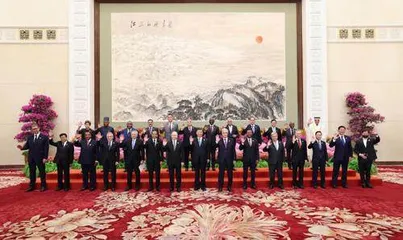China Initiatives Boost Common Development of Global South
作者: Zhang Chun

As the profound changesunseen in a century acceler-ate, human development undergoes a new inflection point. Continuously intensifying deficits of peace, development, security and governance make it imperative for mankind to have systematic, yet fea- sible international public goods, to integrate forces in the international community in jointly promoting the building of a community with a shared future for mankind. At the same time, as development levels of all countries in the world are un- even, the priority area of building such a community lies in common development of the Global South. It is against this background that China has put forward major initiatives like the Belt and Road Initiative (BRI), the Global Development Initiative (GDI), the Global Security Initiative (GSI), and the Global Civilization Initiative (GCI), covering key areas in building a community with a shared future for mankind. Together they provide systematic Chinese concepts and Chi- nese approaches for human devel- opment at the crossroads to further improve global governance mecha- nisms, tackle common challenges facing human society, and especially promote unity and cooperation of the Global South with Chinese wisdom.
CONNOTATION AND FEATURES OF CHINA INITIATIVES
Since 2013, China has produced a series of initiatives dedicated to pro- moting the construction of a commu- nity with a shared future for mankind in different domains, particularly providing an important impetus for common development of the Global South. Compared with the previously existing initiatives in the internation- al community, China Initiatives have unique connotation and features.
First and fundamentally, China Initiatives have built domain mod- ules to the promotion of building a community with a shared future for mankind. In fact, the practical path of building a community with a shared future for mankind is simultaneously developed in two directions: geo- graphical region and topic domain, namely geographical modules and domain modules. At the beginning, the domain module initiatives China proposed were relatively focused, such as the Cooperation Initiative on Global Food Security, the Initiative of International Cooperation on Resil- ient and Stable Industrial and Supply Chains, and the Global Data Security Initiative. As China deepened its un- derstanding of the profound changes rarely seen in a century and of theiraccelerating evolution, it came up with the BRI and the G3 initiatives (GDI, GSI and GCI) successively, proposing solutions to issues in core domains of economic growth, social development, peace and security, and progress of civilization, and providing an integrative framework for all kind of previous initiatives. Thereby, China Initiatives have moved on from the ones that promote a community with a shared future for mankind with domain modules towards an increas- ingly systematic and all embracing whole, laying a solid foundation for building a community with a shared future for mankind to enter the stage of “filling in the details”.
Second, China Initiatives enable the organic integration of geographi- cal modules and domain modules for building a community with a shared future for mankind. The geographi- cal modules of building such a com- munity cover country, sub-regional and regional levels, and then cover the whole world. At the country level, China has reached a strategic consen- sus on building a community with a shared future mainly for neighboring countries such as Pakistan, Vietnam, Myanmar, Laos and Cambodia. At the sub-regional level, it has mainly included a community with a shared future for the Lancang-Mekongcountries, that for China-ASEAN, that for China-Central Asia, that for Chi- na-Arab, and that for Shanghai Coop- eration Organization. At the regional level, China has reached strategic consensus with African, Latin Ameri- can and the Caribbean, and Pacific island countries on building a com- munity with a shared future. It means that China has reached a strategic consensus with relevant countries in the overwhelming majority of the geographical modules in the world on jointly building a community with a shared future for mankind, and has thus put in place creative practices.
When domain modules and geo- graphical modules are organically combined, building a community with a shared future for humankind becomes concrete and operable. This combination of domain modules and geographical modules works two- way. On the one hand, domain con- notation is added to the geographical modules, making the construction of a community with a shared future for mankind geographically specific. On the other hand, the domain modules can be implemented in different geographical regions. To realize the organic combination and mutual embedding of geographical modules and domain modules is the basis for “filling in the details” in building a community with a shared future for mankind, and also the fundamental requirement of China Initiatives.
Third, China Initiatives are im- portant public products China has contributed to the international com- munity in the new era. This attribute is most evident in the important con- tributions to easing the global gov- ernance deficit. After the outbreak of the global financial crisis in 2008, the international community failed to find an effective recovery plan over a long period of time. In 2012, the G20 Summit in Los Cabos, Mexico pro- posed that the top priority of the in- ternational community remained to seek strong, sustainable and balanced economic growth. It was against this backdrop that President Xi Jinping put forward the BRI in 2013, aiming to provide strong dynamics for world economic recovery and the implementation of the UN 2030 Agenda for Sustainable Development. From 2016 on, there were frequent black swan and gray rhino incidents rep- resented by the Brexit, the rise of populism in the United States (US), and the outbreak of COVID-19, while deficits of peace, development, se- curity and governance continued to increase. The making of the GDI, the GSI and the GCI in fact became the “timely rain” to alleviate the above deficits.